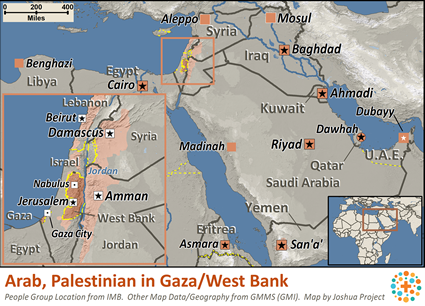Palestinian Arabs in the West Bank are an indigenous people with deep historical roots in the region. Their identity has evolved over centuries, shaped by Arab, Ottoman, and later British rule. While historically identified by local or religious affiliations, the rise of Arab nationalism in the 20th century fostered a collective Palestinian identity.
Linguistically, Palestinian Arabs speak Levantine Arabic, with dialectal variations influenced by historical interactions with neighboring cultures. Arabic remains the dominant language, though English and Hebrew are also spoken, particularly in political and economic contexts.
The Israeli-Palestinian conflict has significantly impacted their history. Following the 1947 UN partition plan and the establishment of Israel in 1948, many Palestinians were displaced. The West Bank was under Jordanian control until Israel occupied it in 1967.
On May 14, 1948, the Jewish population declared its independence by establishing the State of Israel. The armies of Egypt, Iraq, Jordan, Lebanon, and Syria promptly invaded Israel. Large numbers of Palestinian Arabs fled during the fighting, while others were expelled from their homes in what is called in Arabic the 'Naqba', or "Tragedy." Israel managed to maintain its independence and expand its borders. What remained of the territories allotted to the Arab state in Palestine were occupied by Jordan (the West Bank) and Egypt (the Gaza Strip) from 1948 to 1967, when Israel occupied those areas in the Six-Day War. Since then, Palestinians have sought statehood, with ongoing disputes over sovereignty and self-determination.
Today, Palestinians in the West Bank maintain a strong national identity, with many also living in refugee communities across the Middle East and beyond.
Palestinian Arabs in the West Bank lead lives shaped by tradition, modern influences, and political realities. Many work in agriculture, particularly olive farming, while others run small businesses, work in the Palestinian Authority, or seek employment in Israel, though permits and restrictions limit access.
The family remains central to social life, with large gatherings, traditional weddings featuring Dabke dancing, and strong community ties. Cultural identity is reflected in traditional embroidery (Tatreez) and cuisine, with dishes like Maqluba and Musakhan being staples. However, daily challenges include checkpoints, movement restrictions, high unemployment, and political instability.
Many Palestinians are married to foreign women, who often come to live with their husbands in the West Bank and/or Gaza. Since the beginning of the uprising in September 2000, Gazans have not been allowed to travel to the West Bank. Even the foreign women married to Palestinians, who have residency in Gaza, have now found themselves confined to the tiny, impoverished territory. They feel trapped, like they are living in a prison. They want to visit friends and relatives back home, but foreign passport-holders are not getting permission to cross into Israeli territory to fly out. It is believed that there are hundreds of foreign women subject to the same restrictions as their husbands and the Palestinians.
Turmoil in Israel and the West Bank/Gaza makes Christian witness to the Palestinians challenging, but turmoil sometimes makes people more open to change.
Most Ossetians professed Christianity, which came from the Byzantine Empire and Georgia during the sixth and seventh centuries. Islam spread into Ossetia in the seventeenth and eighteenth centuries, and a large number profess Islam (Sunni).
Ossetians in Ukraine need the spiritual hunger it takes to seek and find Jesus Christ with all their hearts and minds. "Religion" is easily compartmentalized rather than a central part of life.
Pray for peace in the West Bank and Gaza.
Pray for Palestinian disciples to make more disciples.
Pray for them to have the spiritual hunger it takes to find and embrace Jesus.
Pray for entire Palestinian families to study God's word and to embrace the only savior.
Scripture Prayers for the Arab, Palestinian in West Bank / Gaza.
| Profile Source: Joshua Project |



























